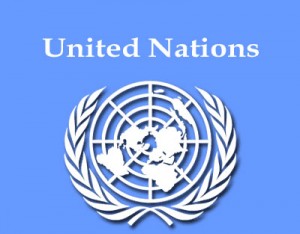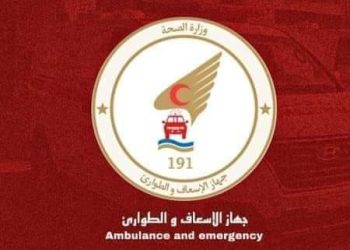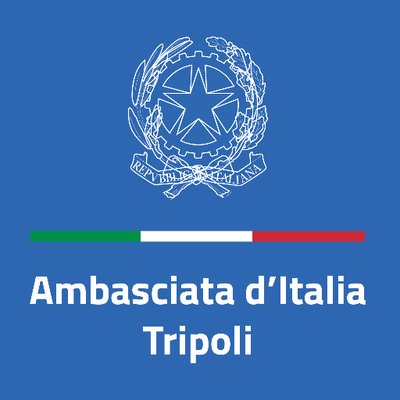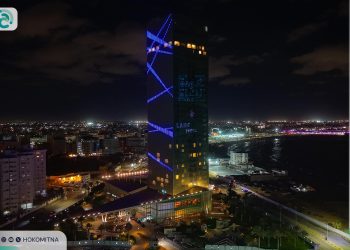By Sami Zaptia:

London, 11 March 2018:
Most Libyan militias involved in illegal migration activities are nominally affiliated to official state security institutions, the UN Libya Experts Panel report states in its section on human trafficking and financing of armed groups.
‘‘Armed groups, which were party to larger political-military coalitions, have specialized in illegal smuggling activities, notably human smuggling and trafficking. The drastic rise in the numbers of migrants starting in 2014 indicates that illegal migration in Libya is not the preserve of isolated armed groups but of much larger coalitions. Most armed groups involved in these illegal activities were nominally affiliated to official security institutions. In 2014, the number of migrants that took the central Mediterranean route (great majority through Libya) was 170,664, compared to 45,298 and 15,151, respectively in 2013 and 2012.
Role of SDF and links with smugglers
The Special Deterrence Force (SDF) is an armed group affiliated to the Government of National Accord’s Ministry of Interior, with policing and security functions, including investigation of human traffickers and the arrest of illegal migrants.
Testimonies of migrants, originating from Eritrea, reveal that when they reached Tripoli from Bani Walid in July 2016, they were arrested by SDF. They confirmed that, once arrested by SDF, they were handed over, against payment, to various migrant smuggling rings for onward journeys to Zawiyah and Sabratha.
Some were handed over to the Mitiga detention centre, while others were taken to the Tajura and Abu Slim detention centres. These three centres are theoretically subordinated to the Ministry of Interior’s Department Combatting Illegal Migration (DCIM). The group detained in Mitiga had to pay the SDF between 300 and 400 USD each, for their release and transfer from Tripoli to Sabratha.
Four Bangladeshis told the Panel that they landed in Tripoli from Dhaka on 15 July 2015, holding valid Libyan work visas. On arrival, SDF seized their passports and detained them for three months in Mitiga. They were subsequently transferred to Sabratha, and sent on boats against their will to Europe after being extorted of 300 USD paid in cash to the SDF elements.
The Panel is assessing whether the SDF’s leadership was aware of collusion and trafficking being conducted within its ranks.
Role of Eritrean smugglers
In Tripoli, a well-structured network of smugglers coming from East Africa has operated since 2008. Multiple testimonies collected and corroborated by judicial authorities indicate that the leadership is composed of two Eritreans living in Tripoli, Ermias Ghermay and Abd al-Razzak Fitwi.
They play a key role in organizing the smuggling from the migrants’ homeland to Italy against substantial payments. Interviewees claimed that Fitwi acts as a broker and receives up to 1,500 US dollars per person, to release the migrants held in the official detention centres in Tripoli and to send them to Sabratha.
An armed group member from Tripoli, told the Panel that Fitwi and Ghermay paid substantial fees to prominent armed groups to pursue their activities and to guarantee their safety. They also have private detention camps in Tajura, Abu Slim and Gargaresh guarded by Africans. From there they transport migrants to Sabratha or Zawiyah.
Use of State detention facilities for trafficking
The Directorate Combatting Illegal Migration (DCIM) is responsible for 24 detention centres and employs 5,000 staff. Under Libyan legislation, the migrants are detained because they are considered as illegal aliens, subject to investigation by judicial authorities.
According to international agencies, the DCIM has no control over its detention centres. The administration is almost non-existent, and records on the migrants, who have been detained, are poor. A minister of the GNA admitted in a discussion that the armed groups are stronger than the authorities in handling the flows of migrants. Several migrants also confirmed that the local armed group controlled the centres they stayed in.
Smugglers in Sabratha
Sabratha is the main departing point of migrants to Italy. The city is divided between two competing armed groups involved in migrant smuggling. The eastern zone is under control of Mosab Abu Grein al Wadi armed group. The western zone is held by Ahmad al-Dabbashi’s Martyr Anas al-Dabbashi Brigade.
Anas al-Dabbashi Martyr Brigade
The commander of Anas al-Dabbashi Martyr’s Brigade, Ahmad al-Dabbashi (alias al- ‘Amu), was the main smuggler in Sabratha from 2014 until he was ousted in October 2017. West African migrants rescued in Lampedusa in April 2017 testified in Italy on al-Dabbashi’s modus operandi.
The interviewees were forced to call their families to transfer money to specific bank accounts located in Europe, Africa or the Middle East. From October 2016 to April 2017, they had to pay up to 2,000 USD each for their travel. The money was extorted by armed guards composed of Libyans, Nigerians and Gambians. The African guards work for three months to pay their own migration to Europe. The interviewees sailed, on 13 April 2017, with two of their former guards from Sabratha to Lampedusa.
The Panel is investigating the GNA’s creation and financing of the anti-illegal migration unit, “Brigade 48”. Although it was supposedly under the Ministry of Defence and the Chief of Staff, sources stated that al-Amu’s brother, Mohamed al-Dabbashi, headed it. In summer 2017, al-Dabbashi’s brigade had apparently shifted from trafficking to policing migrants for the GNA’s account.
Furthermore, several open sources reported an alleged deal with al-Dabbashi to contain the migration flows from Sabratha. Although the information was denied, it triggered violent clashes between competing armed groups involved in smuggling. Ahmad al-Dabbashi was defeated and escaped Sabratha on 6 October 2017. The PC dissolved the Brigade 48 on 16 November 2017.
Role of Mos’ab Abu Grein
Mos’ab Abu Grein (alias “The Doctor”), a leader of al-Wadi Brigade, operates in the eastern part of Sabratha. He is connected to a network of smugglers composed of Salafi armed groups in Tripoli, Sebha and Kufra. The Panel interviewed three different Eritrean migrants who reported that they were taken from SDF’s Mitiga detention centre to the Abu Grein facility in Sabratha in July 2016. They were detained in a hangar with African guards from where Abu Grein organizes departures on inflatable rubber boats to Italy.
The interviewees said they paid Abu Grein 1,500 USD cash via a Nigerian broker to cross the Mediterranean. According to official sources, Mos’ab Abu Grein enjoys impunity for his activities in migrant smuggling because he collaborates with the SDF to counter drug traffickers, consumption of alcohol and combats alleged links of Sabratha and Zawiyah traffickers to listed entities such as ISIL.
Abu Grein and Dabbashi have been in close competition, both seeking to monopolize the trafficking in Sabratha. From 21 September, Abu Grein supported the anti-ISIL Operation Room (AIOR) to combat the Brigade 48 armed group. The Panel notes that the warring parties, the AIOR and the Brigade 48, were officially financed by the GNA until the conflict broke out in Sabratha.
Zawiyah
Al Nasr Brigade and the Coast Guards
Between Tripoli and Sabratha, Zawiyah port plays a distribution role. According to interviews of migrants and judicial reports, ‘Al Nasr Brigade’ 56, headed by Mohamed Koshlaf, and Zawiyah Coast Guards, was connected to Ahmad al-Dabbashi’s organization. Several migrants paid 100,000 to 150,000 Francs CFA57 to a Burkinabe broker operating between Koshlaf and the migrants.
Other interviewees, who travelled in April 2017, asserted that their group left Zawiyah by night, crammed on a 10-meter inflatable rubber boat. While at sea, men with an official boat and wearing Coast Guard uniforms stopped them. They shot in the air and extorted the passengers’ money and valuables. When the boat arrived at calling distance off the Italian shores, the same official boat returned to seize the rubber boat’s engine. Similar incidents have been reported previously.
Southern Region
Brigade Subul al-Salam
Eritrean and Ethiopian interviewees described their transfer, in January 2015, from the Sudanese border to Al Kufra. An Eritrean fixer, called Afra Waiki, transported and handed them over to an armed group, Brigade Subul al-Salam, affiliated with the LNA and under the command of Abd al Rahman Hashem from the Zway tribe in al-Kufra.
The interviewees said they were put in a prison where the guards were dressed in police uniforms and driving official police cars. For their release, each migrant had to transfer up to 300 USD to a foreign bank account. In July 2015, they could continue their travel to Bani Walid driven by another Eritrean fixer known as Wadi Isaaq.
Role of Tebu armed groups and Sudanese armed groups
Sources indicated active involvement of Tebu and Darfuri armed groups, supported by Darfuri mercenaries in the south, in migrant smuggling. They operate particularly in the Tamassa region, in the south west of Jebel Arrush, Murzuq and al Kufra. The Tebu manage their own warehouses for migrants while Darfuri armed groups provide protection and escort to the traffickers.
Recent developments have shown attempts to counter the groups involved in migrant smuggling. In September 2017, an armed group called the ‘Suqur al Sahara’ headed by the Tebu commander, Barka Shedimi, claimed the closure of the borders with Niger, Sudan and Chad to halt human trafficking. Similarly, a coalition of armed groups linked to Murzuq Municipality also created their own border protection force. The Panel is investigating these decisions, particularly the political and the financial motivations behind them”.








